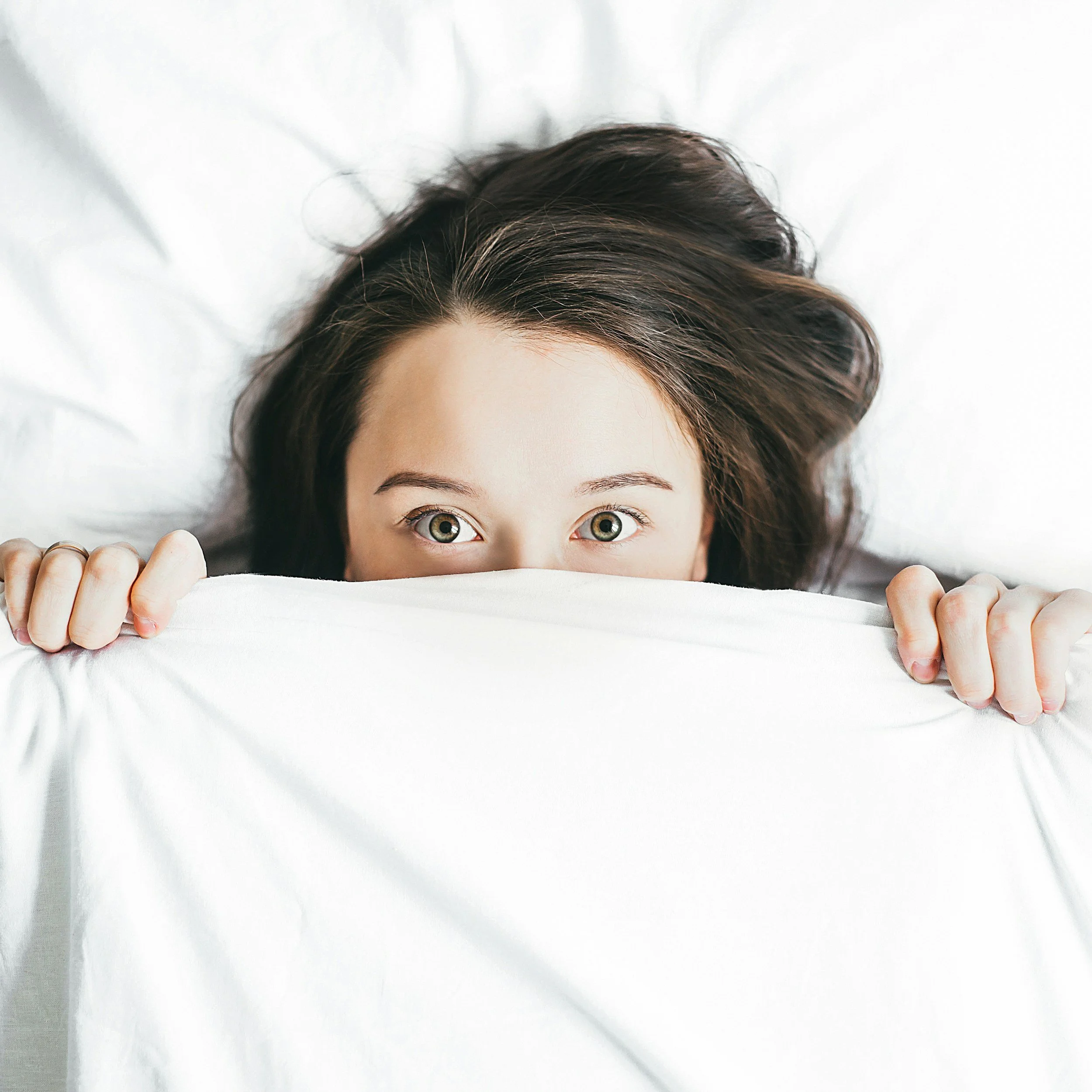how to fall asleep quickly - and stay asleep
5 key lifestyle habits to improve your sleep quality
Many moms struggle to fall asleep at night, and to stay asleep. We want to sleep but it feels elusive. The brain is still going full force with racing or anxious thoughts even though the body is ready to be tucked in.
There are many reasons why it feels more difficult to get a full night’s sleep in this modern era and in your specific season of life: raising little people. Here are just a few:
Busy, hectic days with little to no downtime for our thoughts to rest
Exposure to blue light at night
No exposure to sun in the morning
Little ones waking us during the night
Hormones
Caffeine after noon
Going to bed very late to have a few moments of quiet after the kids go to sleep
Waking up at a different time each morning
Some of these things we can’t change (for example a rotating shift schedule), but some of them we can.
We can’t “hack” our sleep in a way that is meaningful long term. We are here to learn how to become healthy forever, to allow our bodies to heal and age gracefully with strength. To put habits in place that support our healing and prevent disease from developing.
When I was deep in the pit of despair I experienced what I called soul-sucking insomnia. I had intrusive thoughts at night preventing me from falling asleep. When I did manage to get to sleep I sprung awake at 3am with anxiety that felt like a metal shield on my chest. My mental health plummeted, taking my physical health with it shortly thereafter.
We need sleep to feel emotionally regulated and maintain cognitive function (1), to stabilize insulin and blood sugar levels (2), maintain a stable weight (3), and clear out waste products from the brain (4). Sleep is such a beautiful way to heal our body and brain, and yet as a working mom it can feel terribly difficult to come by.
Instead of focusing on sleep-hacks, focus on adding one lifestyle change at a time to improve sleep. After you have one in place, you can add another. Here is a list to pick from to help you get started (with my 2 favorites listed at the top, that helped me heal insomnia).
How to get better sleep
Morning sun to help you sleep at night
Circadian rhythm…it’s a huge player in our heath! I truly believe that getting morning sun, along with activating my parasympathetic nervous system (PNS) during the day, is what helped me get out of the crushing cycle of insomnia. I highly suggest starting with morning sun if you are experiencing any difficulty with falling or staying asleep.
Circadian rhythm is our body’s natural 24 hour internal clock that keeps us on our wake and sleep cycle. Many systems in our body follow this natural clock. Studies show that the most important synchronizer of our circadian clock is the light-dark cycle (5), meaning exposure to light and then darkness tells our body when to be awake, and when to be asleep.
Getting bright morning sun normalizes cortisol levels. We want a peak in cortisol (even though we’re always told cortisol is bad, it’s actually a natural process to have cortisol go up and down) to wake us up in the morning, and morning light helps regulate this process.
Sunlight entering our eyes is how our body knows it’s daytime, thus keeping our internal clock on track. The light inside your house or workplace isn’t strong enough to get the strong circadian synching effect we want. So, it’s important to get outside, ideally within the first hour that you wake up. Even if it’s cloudy, still head out to get that early sun into your eyeballs.
And please, no sunglasses. I know here in California during the summer it’s super bright even in the early morning, but I wear a hat instead of sunglasses, which block the effects of what we are trying to achieve.
Try it, go outside for 10-20 minutes every morning and see if you have an easier time falling asleep. Even now, a few years after healing insomnia, if I find myself having a hard time falling asleep, I get up before the kids to take an early morning walk. It always pays me back in better sleep.
Mindfulness: 5 minutes of quiet to activate your parasympathetic nervous system
The second most important factor (for me) in learning to fall asleep, and staying asleep, was learning to release stress during the day so my body and brain felt safe enough to fall asleep at night. If you are running around in chaos during the day, your brain will remain in a state of hypervigilance at night. That equals terrible sleep!
It’s imperative we find time every day to get our brain and body into the PNS, the nervous system state that allows us to rest, feel calm, digest (absorb nutrients from what we eat)…and sleep.
We can activate the PNS through mindfulness meditation, a practice where you focus on the present moment to facilitate mind-body calmness and relaxation. This practice has been shown to improve symptoms of insomnia (6).
I first started a mindfulness practice focused on my breathing. I used an app called Insight Timer to guide me through various breathing exercises. My favorite was to do 4-7-8 breathing in my car before my shifts at the hospital. I also did breath-work in my bed at night to bring on blissful sleep, instead of ruminating on dark thoughts.
You can find what works for you. 5 minutes of putting your hand on your heart and noticing what you hear, see, and smell around you. Sit with a cup of tea and notice all the sensations of drinking the tea, without worrying about what the day ahead will bring. With time, if you spend more moments focusing on the present-what’s happening to you right now- your body will begin to feel more safe. Safe enough to fall asleep at night.
Limit artificial lights at night
I think we’ve all heard about the effects of blue and artificial lights on the quality of our sleep. The self-luminous displays from phones, tablets, TVs etc inhibit the production of melatonin (7) which is harmful to our sleep because melatonin is a hormone produced under darkness. And melatonin is the messenger to cells in our body that says, “hey guys it’s nighttime and time to sleep.” We want to stimulate the production of melatonin naturally, which happens when we are exposed to the slow sun-setting and ensuing darkness, not lights from screens.
Every Friday is movie night at our house and I look forward to it every week. So that is the night where I do have exposure to the blue light from the TV. But all other nights, I do not look at my phone for longer than a few minutes or watch TV. I know many people want to relax with TV or their phone before bed, but again, if you’re having trouble falling asleep maybe try this out for a week. See what happens.
Replace watching TV or scrolling on your phone (which can trigger your fight or flight response, which definitely doesn’t facilitate peaceful sleep) with something else.
Read a book, stretch, do breathing exercises, talk with your kids…something that doesn’t involve a screen. And if you do occasionally have to watch a screen, and we all do, there is the option of blue-blocking glasses, but it’s still more important to dim the lights.
Consume caffeine before noon
I love my sleep, and I love my tea. Since I want to keep both I’ve read a lot of different studies and blog posts about the effects of caffeine on sleep. In short, caffeine definitely has the potential to disrupt falling and staying asleep. Especially if you drink more than one cup of coffee and get closer to consuming 400mg (2-4 cups) of caffeine within 12 hours of bedtime, which creates significant delays in falling asleep! (8)
Dr Matthew Walker, a sleep expert from UC Berkeley, discusses the effects of caffeine on sleep during an interview with The Huberman Lab. Dr Walker advises to avoid caffeine within 12-14 hours of bedtime. That means, if you go to bed at 10pm, you should finish your favorite caffeinated beverage by 8-10am. Wow, that seems early! But I actually fall asleep easiest when I have my tea before 12pm and have worked with many women who experience better sleep if they stick to caffeine only in the morning.
If you’re really in a hard cycle of poor sleep, you might consider stopping caffeine altogether, at least for a time. I know, I know, I hear you saying, “but Sarah I need my coffee!” It’s true, our warm caffeine drinks are amazing. And so is the power of sleep. Try it, for a little while, and evaluate your sleep quality and how you feel. You can always add caffeine back in later.
Get your body moving during the day
Exercise, just like sleep and regular bowel movements, improves every aspect of your health.
Moving during the day and partaking in some exercise has been shown to improve the amount of time it takes to fall asleep, sleep quality, and feelings of waking up rested in the morning (9). I will totally take that!
I know that fitting in exercise with everything else you have to do can be a challenge. I don’t think there is a quick fix or way of getting around exercise. Take a look at your schedule and see if you have a pocket of time where you can take a walk, lift weights, or take a class with a friend.
Taking a 30 minute walk in the morning before my kids wake up has become one of the best things that has improved my physical and mental health. I get some movement and early morning sun into my eyeballs. I get to focus on the present moment and listen to the birds without thinking about my to-do list. My brain and body feel so much calmer.
Side note: if you find yourself laying awake in bed, don’t stay there. We want to train our brain and body to know that when we lay in bed, we fall asleep.
It’s recommended to get up and do something quietly, like read a book with a small light (no screens) until you feel sleepy again. Then head back to bed.
What surprised you about the measures you can put in place to improve your sleep?
What are you willing to try today?
Want help with falling asleep and staying asleep all night? Join my weekly newsletter where we talk all things health for the busy momma. See you there.



